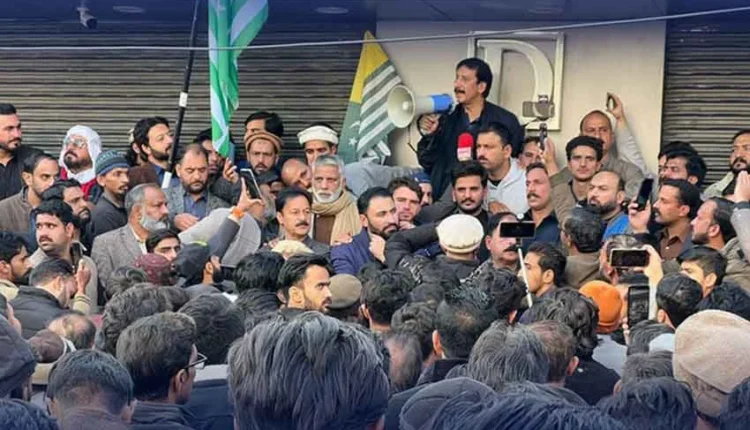
Breakthrough in Talks: Govt and Action Committee Seal Draft Deal After AJK Protests
Agreement to Be Signed Soon, Says Iqbal; Review Committee Formed on Demands
Islamabad-(Mudassar Iqbal)-Federal Minister Ahsan Iqbal announced that the government and the Awami Action Committee (AAC) have reached a consensus on an agreement, with both parties now examining the draft. Speaking on PVT TV who is part of the government’s negotiation team — expressed confidence that the agreement would be signed shortly. He described the development as a success for Pakistan, the people of Azad Jammu and Kashmir, and the democratic process.
A permanent committee has been constituted under the supervision of the Minister for Kashmir Affairs, Amir Muqam,” he said, adding that the committee will meet every 15 days to review the implementation of the demands.
Responding to a question regarding the action committee’s demand to end reserved seats for refugees, Iqbal said that a committee of constitutional experts would be formed, which would review all aspects and make a decision.
“The decision taken after the review will be accepted by everyone,” he said, adding that this was a constitutional matter and “there will be no haste in it.”
His statement hours came after second round of negotiations between the awami action committee and a government-appointed negotiation team resumed in Muzaffarabad.
The talks resumed between a delegation sent on the directives of Prime Minister Shehbaz Sharif and representatives of the public action committee shortly after Friday prayers.
The action committee has been organising protests in the Azad Jammu and Kashmir (AJK), which turned violent and claimed the lives of at least nine people, three of them were police personnel, and injured over 100.
The region is witnessing an overwhelming shutdown and wheeljam strike amid intermittent skirmishes between law enforcers and activists in the state capital, Muzaffarabad.
The JKAAC had issued a 38-point charter of demands, including ending 12 reserved seats for refugees and rolling back “privileges of the elite”, according to The News.
Participants from the government side included Federal Ministers Tariq Fazal Chaudhry, Amir Muqam, and Ahsan Iqbal, while Raja Pervez Ashraf, Qamar Zaman Kaira, Rana Sanaullah, and others were also present.
Core members of the action committee, including Sardar Masood Khan and Sardar Yousaf, took part in the discussions.
The action committee members demanded restoration of internet services, and officials said final consultations on the remaining demands will take place during the negotiations.
Federal Minister for Parliamentary Affairs Chaudhry said they fully support the rights of the Kashmiri people and noted that most demands judged to be in the public interest have already been accepted.
He added that a few outstanding requests require constitutional amendments and are therefore subject to further discussion.
Chaudhry emphasised that violence is not a solution and expressed hope that the action committee will resolve outstanding issues through peaceful dialogue.
JKAAC demands immediate restoration of internet services.
- Law minister warns against hasty constitutional changes.
- Govt urges finding solutions through peaceful dialogue.
Law Minister Azam Nazeer Tarrar highlighted the legal and constitutional dimensions of the ongoing talks. He stressed that the electorate in the 12 constituencies reserved for AJK comprises people originally from Kashmir, whose connection to the region remains intact despite displacement, and cautioned against any steps that might abruptly weaken those ties.
Tarrar underscored the importance of introducing a well-structured constitutional framework through broad-based political consensus, ensuring the participation of all Kashmiri leadership. He advised against rushing into constitutional amendments or changes to fundamental rights, warning of complex legal hurdles as well as possible political and social repercussions.
He further noted that the Kashmir constitution contains no provision for a referendum and argued that taking hasty or unilateral measures could undermine the larger Kashmir cause



Comments are closed, but trackbacks and pingbacks are open.